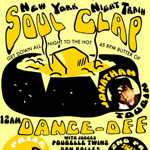NY Night Train Soul Clap & Dance-Off Top 500 (461-480): Track by Track
The second installment, numbers 461-480, of my Soul Clap and Dance-Off Top 500 list where I count down my favorite original 45s from the Soul Clap & Dance-Off party. This page is both a track list and supplement to my Soundcloud mix/podcast. Since the records are all pitched, cut, and yelled over there the way I do it at my parties, this page and its YouTube playlist give you a chance to hear the original vinyl in its natural state and learn more about the records and the artists. I’ve also provided links to where you can get more in-depth in your soul journey. Thank you for listening!
461. Willie Hamilton and the Counts “Cheer Up” (HRP, ?)
This relentless flash of lightning is the sole solo release by Los Angeles drummer Willie Hamilton with his own combo The Counts. And if the bounce, fire, and good vibrations of this longtime personal Los Angeles favorite doesn’t achieve its goal of making you feel glad all over, you have no pulse!. Hamilton’s daughter Renee got in touch because of a past post and informed me that her father recently passed away at 87. After this record he moved to Houston where he quit music, started a family, and in her words, “completely left his old life behind and started over.” Renee also sent me the below photos of him looking incredibly fly. Since the weather’s turning, COVID’s retreating, and we certainly have the right soundtrack, I’m ready to dive into this adventure with a message to you from Willie Hamilton and The Counts… “Cheer Up!” 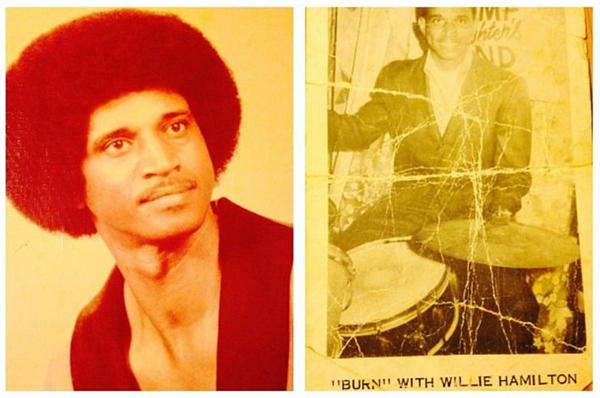
462. Johnie Brown and The Fabulous Arcades “Watch Me Work” (Puff, 1967)
I was beyond lucky to come across a copy of this action-packed rarity at Detroit’s fabulous Hello Records! Motor City keyboard maestro and early Motown consultant T.J. Fowler’s Puff imprint went out with a bang on its final release! “Watch Me Work” is pure dynamic dynamite by one of the thousands of undocumented sexy James Brown-crazy soul men mashin’ their potatoes all over the USA throughout the ’60s. But don’t dismiss Johnie Brown as “soul brother 1,642!” He’s got a bag of his own and this track is nonstop thrills and chills and his performance oozes wild exuberance! While there’s no information about there about either Brown or this record, this is how I like to imagine it went down:
While James Brown was cold sweating into funk in 1967, the ghost of James Brown Christmas past, of “Tell Me What You’re Gonna Do,” “Dancin’ Little Thing,” and “Have Mercy Baby,” haunted a Detroit recording studio. The apparition snuck up on The Fabulous Arcades, interrupting their session, introducing himself as Johnie Brown, and proceeding to howl like a banshee! Demanding they watch him work, the mesmerized band followed his every move as he proceeded to execute a dizzying vocabulary of dance steps: the jerk, the dog, the watusi, the monkey, the fly, the bird, and of course the James Brown! The band stopped with razor precision on the one every time the blurry apparition emerged from the splits. At which point he’d spin around, slide into a Joe Tex mic stand trick, and howl a blood-curdling shriek! The energy heightened until the entire room was engulfed in flames! And the band played on! When they smashed into their last beat, the fire vanished and Johnie Brown disappeared into a Puff of smoke. All that was left in the eerie silence that followed was perspiring walls, fogged-over control-booth windows, and settling dust. The Fabulous Arcades shook their heads, passed a flask, and agreed the seance must’ve been their imaginations running away with them. Perhaps they were so musically interconnected, and so lost in the feel of classic 1964 James Brown, that they conjured the godfather’s musical spirit to the point where they felt him there in the flesh.
As they filed into the control room to hear the playback, the baffled engineer’s hands shook and his arm hairs stood on end as he tried in vain to lower the faders and stop the reels from pushing the irrepressible wail of Johnnie Brown through the monitors at ungodly volume. There in the circular ruins of the amps and mics and drums, The Fabulous Arcades dreamed a man. And not just any man but the hardest working man in show business. Therefore The Fabulous Arcades, who made a blood pact to never speak of the incident again, couldn’t protest when T.J. Fowler said he was going to cut their most harrowing memory into the grooves of this wicked record.
463. Frankie Seay “All I Want Is Loving You” (Tropical, ?)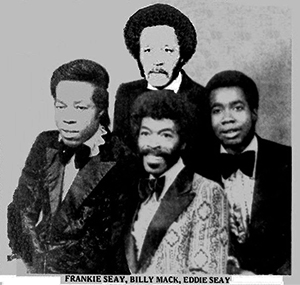 If you’re ever lucky enough to encounter any one of Frankie Seay’s three platters on Miami’s Tropical imprint, definitely don’t dilly dally – grab it up and ask questions later! Unlike Seay’s stint in a fake Mills Brothers, Frankie and his Soul Riders are the real deal and then some! While their best known track the immortal “Soul Food” gained prominence around the turn of the century on DJ Shadow and Cut Chemist’s massively influential “Brain Freeze” comps, and all three 45s ooze soulfulness and the perfect mix of raw and musical, “All I Want Is Loving You” is by far the most unique and my personal favorite. Dig the slammin’ rhythm section, the wild and weird horn harmony, and the rapid fire overdriven guitar slither! Plus Seay’s vocal grit, ecstatic delivery, and screams shoot this one over the top! And this is the good kind of lo-fi production where, despite its rough edges, all of the right elements poke out! Crackling with passion, adventure, and electricity, The Soul Rider’s are so darn good that they don’t even need proper songwriting here! Its as if the engineer pressed record to let us get a peek into this spectacular wonderland and then randomly closed the curtain when he thought we’d seen just enough to know that we’re the kind of losers who’ve been missing out our entire lives! And that we’ll crave a whole lot more of this sound but are nowhere near hip enough to know how to find it. And while I can only begin to imagine the power and sweat of this track live, and how long and deep and sweaty the band must’ve chiseled away at it, with a half-century perspective, I’m grateful to get even this little taste of the elusive sound and the fury I’m eternally seeking out. I wish all of the records felt like this. And I’m still chuckling when I think of this rough and ready crew in their tuxedos (check out the included pic from 1975!) trying to pass themselves off to senior citizens as The Mills Brothers.
If you’re ever lucky enough to encounter any one of Frankie Seay’s three platters on Miami’s Tropical imprint, definitely don’t dilly dally – grab it up and ask questions later! Unlike Seay’s stint in a fake Mills Brothers, Frankie and his Soul Riders are the real deal and then some! While their best known track the immortal “Soul Food” gained prominence around the turn of the century on DJ Shadow and Cut Chemist’s massively influential “Brain Freeze” comps, and all three 45s ooze soulfulness and the perfect mix of raw and musical, “All I Want Is Loving You” is by far the most unique and my personal favorite. Dig the slammin’ rhythm section, the wild and weird horn harmony, and the rapid fire overdriven guitar slither! Plus Seay’s vocal grit, ecstatic delivery, and screams shoot this one over the top! And this is the good kind of lo-fi production where, despite its rough edges, all of the right elements poke out! Crackling with passion, adventure, and electricity, The Soul Rider’s are so darn good that they don’t even need proper songwriting here! Its as if the engineer pressed record to let us get a peek into this spectacular wonderland and then randomly closed the curtain when he thought we’d seen just enough to know that we’re the kind of losers who’ve been missing out our entire lives! And that we’ll crave a whole lot more of this sound but are nowhere near hip enough to know how to find it. And while I can only begin to imagine the power and sweat of this track live, and how long and deep and sweaty the band must’ve chiseled away at it, with a half-century perspective, I’m grateful to get even this little taste of the elusive sound and the fury I’m eternally seeking out. I wish all of the records felt like this. And I’m still chuckling when I think of this rough and ready crew in their tuxedos (check out the included pic from 1975!) trying to pass themselves off to senior citizens as The Mills Brothers.
You also hear Frankie’s brother, Eddie Seay, who recorded the mod soul Soul Clap spin “Do What’s Right,” here in The Soul Riders!
Check out Sir Shambling’s Frankie Seay page
464. William Patton “Don’t Be So Mean” (King, 1967)
The star of this show is the distorted guitar boldly announcing itself with a single-note shriek out of what appears to be a highly overdriven close-mic-ed small amp! And it sounds way too cool to not reappear over and over again throughout! The otherworldly emotively bent tone’s dominance of the track is unique for even the fuzziest blues of its time – particularly juxtaposed against an otherwise clean and balanced recording. While adventurous contemporary producers were widely employing distorted guitar tones to pop songs in subtle textural bursts by this point, and there’s of course the widely explored use of this convention in blues, country, and rock’n’roll since the advent of the electric guitar, the convention was rarely pushed to this lurid level – dominating the mix throughout. And the deliciously over-baked guitar bends atop the higher fidelity recording reminds me of the similar effect achieved by young Jimmie Page and other Freakbeat session guitarists across the pond around the same time. “Don’t Be So Mean,” with its over-the-top brutalist anti-melodic guitar, shakin’ band, and throaty vocals is an unforgettable experience everybody should have at least once in their life.
I was unable to locate any information about William Patton or his only recording. There are a few interesting clues that don’t tell us a whole lot. First off, one of the writing credits goes to James Brown’s late-’60s producer Bud Hobgood who was similarly credited for co-penning a number of the godfather’s classics (“There Was A Time,” “Get It Together,” etc plus more by Bobby Byrd, the J.B.’s etc). Louis Innis, also known for his own records, can be heard as the studio guitarist on all kinds of country classics dating back to Hank Williams 1947 essential “Honky Tonkin’.” His name also makes an unlikely appearance in the writing credits of “Ball of Fire” – the B-side on two of my favorite funky records: Connie Austin’s pulverizing “She Made A Mistake” and “Marva Whitney’s” canonical “It’s My Thing.” “You & Me” is also the publishing company on a number of these late King releases but there isn’t really a common thread in the songwriters. So my guess is that this was a one-off recorded by the King/Federal staff and since its deafening squall didn’t make a lot of noise beyond the studio, William Patton never recorded again and his name was lost in history. The track however has had a long life of its own from its first appearance on Polydor’s 1970 UK “NonStop Soul” compilation LP (entitled “Black Message” in continental Europe) alongside primarily tracks James Brown and his crew to Kent Records compilations like “King New Breed Rhythm & Blues” (2002) and “King Northern Soul Volume 3” (2012).
465. Mickie Champion “What Good Am I” (Musette, 1966)
West coast r&b goddess Mickie Champion wails all over this perky 1966 mover. Neither a rhythm and blues throwback nor a typical of the 1966 sound, caught between two very distinct eras of rapidly evolving styles, sounds, and technology, “What Good Am I” is a ghost satellite whose lonely transmissions come to us from its own unique space in the exosphere. Despite its R&B feel, this misfit track’s relentless pulse has also warranted its inclusion in the Northern Soul canon. And hearing how Champion makes swinging all over the surface look of so easy, you can hear why Big Jay McNeely proclaimed her “one of the greatest singers out there.” 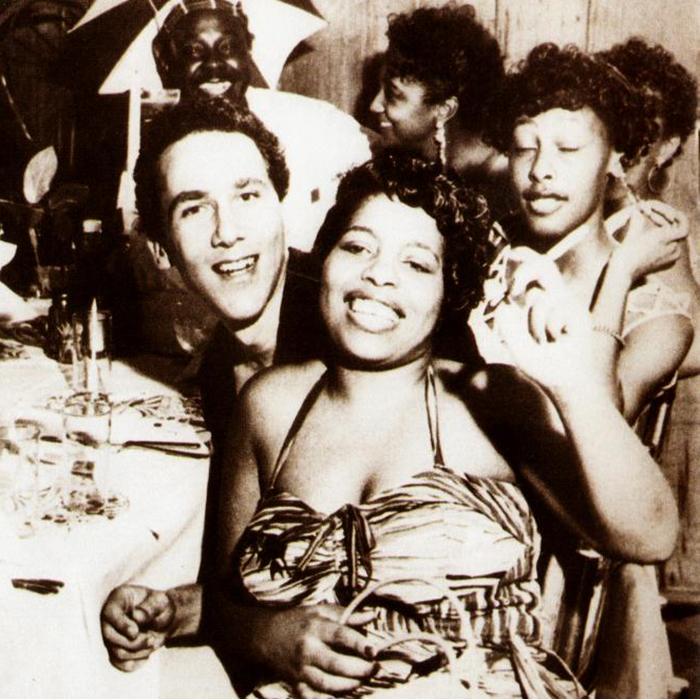
Mickie Champion was born Mildred Sallier in Lake Charles, Louisiana where she became known locally for gospel pipes so powerful that they didn’t need a microphone to echo across the bayou. While her family refused to let her accept an impressed Louis Jordan’s invitation to join his review, after high school she got hitched and made it out all the way from LA to L.A. in 1945. Instantly establishing herself as a nightclub fixture in Central Avenue’s heyday, she was featured as Little Mickey Champion in the reviews of the top west coast bandleaders like Johnny Otis, Percy Mayfield, and her future husband Roy Milton. In addition to a handful of her own releases she also appeared as the featured vocalist on Milton and Jimmy Witherspoon’s records. “What Good Am I” is Mickie Champion’s first recording in years and final release before quitting music to focus on parenting. Returning to the stage and the studio later in life, she released a pair of new CDs on Tondef Records around the millennium and lived to see a 2008 Ace Records compilation of her work before her passing in 2014.
L.A. Times’ Mickey Champion obituary
466. Roger Washington “You’re Too Much” (Joe Davis, 1966)
TThis paced under-the radar New York soul shaker has it all but is way too classy to call attention to itself! Like a number of great 1966/1967 soul records you can definitely feel the fresh impression of the gargantuan footprint left by Robert Parker’s smash “Barefootin’” – rhythmically, melodically, and… check out that irresistible New Orleans guitar trick! Roger Washington’s rich tone and casual delivery make it all look so easy as he glides through the verses with immaculate conversational phrasing. A solid rhythmic foundation compliments Washington’s effortless slips in and out of a breathtaking falsetto and leaves plenty of room for the sexy slither of the gritty blues guitar runs. “You’re Too Much” is cookin’ with a rare combination both gas and class but like Roger Washington himself, this record has for the most part been overlooked fans, DJs, and connoisseurs/collectors. While there’s not a lot of information floating around about Roger Washington, he had a respectable output of ten releases on a smattering of New York labels between 1962 and 1968 – the first four as Billy Washington.
Another item of interest is the fascinating label here. By this point the Joe Davis was a relic whose prolific career had traversed the vast spectrum of the New York music industry since the 1910s. He was a Tin Pan Alley songwriter, publisher, singer, recording artist, manager, publisher, and label boss through ragtime, jazz, swing, and rock’n’roll eras, from sheet music to radio to 78s to 45s and LPs and beyond, he worked with everyone from Fats Waller to Coleman Hawkins to Champion Jack Dupree. 45 collectors will recognize his prolific Gennett, Beacon, and Jay-Dee imprints. By the time he was a senior citizen, he was getting in trouble churning out bawdy novelty LPs with titles like “Naughty Songs For Nice People,” “For Men Only,” and “Play Girl.” He continued working and scheming deep into the 1970s. Eugene Chadbourne summarized, “While it would be a stretch to suggest music history would have been entirely different had there been no Joe Davis, it is indeed difficult to approach any genre of American music without eventually peering over Davis’ shoulder in a recording studio, or handling sheet music that profited him in some way, or perhaps temporarily put him out of business.” For many years I’ve hoped to lay my hands on a copy of Bruce Bastin’s biography, “Never Sell a Copyright: Joe Davis and His Role in the New York Music Scene 1916-1978,” but still patiently wait for an affordable copy.
Eugene Chadbourne’s short Joe Davis biography
Sir Shambling’s Roger Washington page
467. Rudy Tee & The Reno Bop’s “Talk About Soul” (Ru-Tee Hit Records, ?)
Wow! Talk about soul! You’ll never hear anything quite like Rudy Gonzales’ extraordinary tongue-rolling vocal performance here! I picked this raw San Antonio shaker from WFMU’s fabulous Todd-O-Phonic Todd and haven’t put it down since! Everybody knows I’m a sucker for Chicano soul and I love both the West Coast and Gulf Coast variants and all points in between for different reasons (everybody should read Ruben Molina’s excellent history of the subgenre “Chicano Soul”). Though everybody had a radio back then and the Texans covered all kinds of national r&b and soul hits, the regional distinctions heavily identify the sound in in a number of ways – particularly its exploration of Tex Mex styles and rhythms (flip the record and you’re often in for a surprise!) and it’s more swinging southwestern soul character.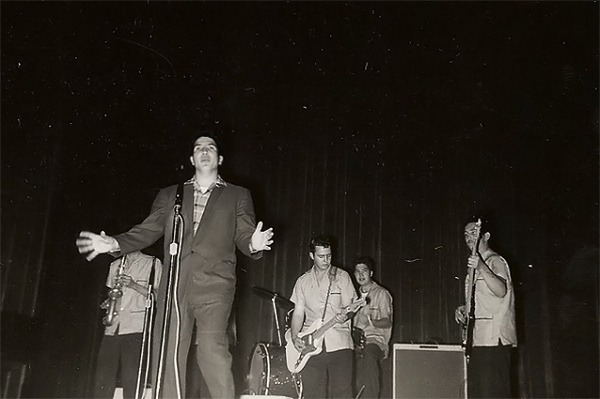
Alongside bona fide legends like The Sunglows (both with and after Sonny Ozuna) and The Royal Jesters, Rudy Tee and his Reno Bops are the top of the heap of quintessential San Antonio dance bands and a primordial exemplar of the Westside sound. Initially rooted conjunto, but under the spell of rock’n’roll and rhythm and blues while still in high school, The Reno Bops’ 1957 recording “I Cry Cry” wasn’t only one of the first shots of this musical revolution, but one of the earliest Chicano rock records anywhere. Rudy Tee has since spent decades exploring the stunningly broad spectrum of his musical tastes, leaving behind an eclectic trail of English and Spanish ballads, Tex-Mex, rockers, soul dancers, and far beyond. And at 81 Rudy Tee Gonzales is still at it! His knockout performance with fellow Westside Sound legends at the 2015 Ponderosa Stomp is one of my cherished musical memories and you should definitely catch him if you’re ever lucky enough to have the opportunity. Also somebody needs to make this hero a Wikipedia page!
Oh yeah! I can’t neglect to mention the important historical fact that Rudy Gonzales took another Rudy, Rudy Martinez aka Question Mark, and his band The Mysterians to Schiell’s Recording Studio in Bay City, Michigan in 1966 to produce the young upstarts’ first single – resulting in the best record of all time “96 Tears!”
A recent Rudy Tee article from MySanAntonio.com
An excellent Rudy Tee and The Reno Bops post from Wired For Sound
Other Rudy Tee and The Reno Bops 45s I spin at NYNT Soul Clap and Dance-Off:
– “The Phillie” (Tear Drop, 1964)
– “Do The Jerk Like Me” (1965)
– “The Tables Have Turned” (1966)
– “Those Long, Lonely Nights” (1966)
468. Gus “The Groove” Lewis “Let The Groove Move You” (Tou-Sea, 1967)
DJ Gus “The Groove” Lewis of New Orleans’ WYLD’s theme song, sole release, and wild funk classic! Appearing on Allen Toussaint and Marshall Seahorn’s short-lived but fabulous Tou-Sea imprint, “Let The Groove Move You” has gotta be Wardell Quezergue’s rawest and loosest production. “Groovy Gus” delivers a character-driven vocal performance chock-full o’ grunts, shouts, and screams while the band breaks it down over and over again and tears the roof off this sucker with no inhibitions. They were definitely having a blast stoking this uninhibited ball of fire and the fun is contagious!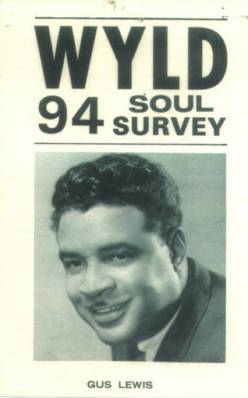 Any of you who’ve checked out Swedish soul connoisseur/producer Jonas “Mr. R&B” Bernholm’s account of his summer search for American soul music, “Soul Music Odyssey USA 1968,” will recall Bernholm’s stop at WYLD where Gus “The Groove” Lewis offered up tips on where to find the soul fire in New Orleans. Lewis was on the air for years, threw record hops, got songwriting credits on legendary Eddie Bo records (need I explain why?), and was one of the most popular ’60s New Orleans DJs. I found an obituary with a few details about his life. He was a Navy Petty Officer in the Korean War and got a degree in education from Dillard University. While at Dillard he worked part time at WYLD and went full-time when he graduated in 1958. In addition to DJing he played every role in radio, working in both New Orleans and Philadelphia over the years as an Account Executive, News Director, Program Director, Sales Manager, and General Manager. He moved to Alexandria, Louisianna in 1981 when he bought into KBCE where he served as the station’s president and GM until his death of cancer in 1995 at 62.
Any of you who’ve checked out Swedish soul connoisseur/producer Jonas “Mr. R&B” Bernholm’s account of his summer search for American soul music, “Soul Music Odyssey USA 1968,” will recall Bernholm’s stop at WYLD where Gus “The Groove” Lewis offered up tips on where to find the soul fire in New Orleans. Lewis was on the air for years, threw record hops, got songwriting credits on legendary Eddie Bo records (need I explain why?), and was one of the most popular ’60s New Orleans DJs. I found an obituary with a few details about his life. He was a Navy Petty Officer in the Korean War and got a degree in education from Dillard University. While at Dillard he worked part time at WYLD and went full-time when he graduated in 1958. In addition to DJing he played every role in radio, working in both New Orleans and Philadelphia over the years as an Account Executive, News Director, Program Director, Sales Manager, and General Manager. He moved to Alexandria, Louisianna in 1981 when he bought into KBCE where he served as the station’s president and GM until his death of cancer in 1995 at 62.
Speaking of Jonas Bernholm, I’d like to highly recommend that all soul music fans check out the diary of his epic journey! A stranger in a strange land, he did an entire 1968 summer economy trip through ten of the USA’s major soulvilles with only three addresses in his pocket (not friends but The Apollo, Chess Records, and Stax) and managed to find his way around the lost world of my dreams and document it. It’s free to read here and also includes his striking photographs.
469. Eddie Buster – Band / Jr. Robinson – Vocal, “Churn The Butter” (M&M, 1968)
An eccentric dance novelty from Chicago with some serious in-the-pocket groove, dabs of lightning guitar runs, and strategic bursts of dazzling horn harmony! I’m so impressed by the ease, economy, and feel of Chicago jazz hot shot aggregation’s deviation into funky dance territory with impeccable musicality, plenty of grit, and airy nonchalance. The bandleader here Eddie Buster is best known as the cookin’ virtuosic organist who swung with the likes of Sonny Stitt, Gene Ammonds, and the heaviest of the jazz heavies. Is vocalist Junior Robinson the same Chicago bandleader who helped launch the career of a more notable Junior, Luther “Guitar Junior” Johnson? Prolific Chi-town sax legend Tommy “Madman” Jones, who gets a writing credit here, ran this M&M imprint after the dissolution of his iconic Mad Records. The other writing credit goes to another famous Chicago sax slinger, Clarence Wheeler, who’s best remembered for leading his own band The Enforcers on their 1970s Atlantic Records soul jazz classics. I’m gonna go out on a limb and say that it would make sense that the stellar session players you’re hearing on this good-time party romp are these sophisticated jazz cats accompanied by a few tuff as nails and equally accomplished musicians whose identities remain lost to history. Since we may never know, probably best to get it out of our minds and “Churn The Butter!”
470. Fred Ramirez “Hold On I’m Comin'” (Warner Brothers, 1967) A knuckle-busting piano exploration of Sam and Dave’s “Hold On I’m Coming” with a funky beat! Cordially welcoming you inside with west coast cool and restraint, Latin jazz journeyman Fred Ramirez gradually fills the space, syncopates all over the beat, and sneaks up heat ’til the whole thing’s ready to blow. The rest of the band remains anchored and somewhat faithful to the original to give Ramirez’s improvisations a rhythmic and harmonic canvas to repaint the melody with Picasso African period angularity.
A knuckle-busting piano exploration of Sam and Dave’s “Hold On I’m Coming” with a funky beat! Cordially welcoming you inside with west coast cool and restraint, Latin jazz journeyman Fred Ramirez gradually fills the space, syncopates all over the beat, and sneaks up heat ’til the whole thing’s ready to blow. The rest of the band remains anchored and somewhat faithful to the original to give Ramirez’s improvisations a rhythmic and harmonic canvas to repaint the melody with Picasso African period angularity.
Los Angeles music legend Fred Ramirez was a child piano prodigy who added vibraphone to his repertoire in his teens and soon was shakin’ with Celia Cruz, Willie Bobo, Tito Puente and generally speaking the pinnacle of latin music pantheon. He also led a number of his own bands and was a member of Atlantic Records Latin psych rockers Macondo.
471. Dee Clark “That’s My Girl” (Constellation, 1964)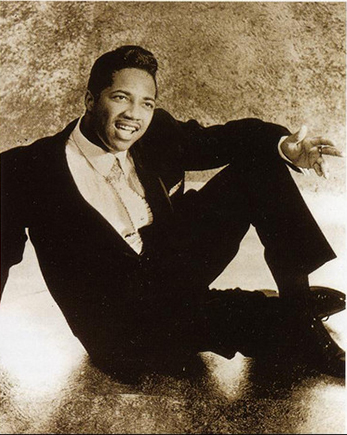 A Soul Clap and Dance-Off theme! Of course I gotta include my only song about a Saturday night dance contest in the 500! Upon hearing “”That’s My Girl” for the first time from WFMU Downtown Soulville’s mayor Mr. Fine Wine many moons ago, I was immediately taken by the “Sugar Shack” riff, fluttering flute, and other deluxe features that make this one-of-a-kind record so unforgettable! And of course the Dee Clark’s masterful delivery, serious pipes, and magical tone can make even the most mundane track endearing!
A Soul Clap and Dance-Off theme! Of course I gotta include my only song about a Saturday night dance contest in the 500! Upon hearing “”That’s My Girl” for the first time from WFMU Downtown Soulville’s mayor Mr. Fine Wine many moons ago, I was immediately taken by the “Sugar Shack” riff, fluttering flute, and other deluxe features that make this one-of-a-kind record so unforgettable! And of course the Dee Clark’s masterful delivery, serious pipes, and magical tone can make even the most mundane track endearing!
Dee Clark scored his first hit in 1952 at the age of thirteen as a member of the Hambone Kids. By the middle of the decade he was the lead tenor in the Windy City vocal group the very cool Kool Gents (also known as The Delegates) who recorded for Vee-Jay. He went solo in 1957 and had a couple of hits on Falcon/Abner but I gotta admit my favorite is the spin is “Oh Little Girl,” the frantic masterpiece where Clark does an incredible Little Richard imitation backed by The Upsetters, and the one I reserve for my Friday rock’n’roll party. “Oh Little Girl” also has an interesting back story. When the king/queen of rock’n’roll was convinced it was the end of the world after spotting Sputnik in an Australian night sky, threw his diamond rings into the Sydney harbor, and abandoned secular music for god, his band still had a number of U.S. engagements to fill. So young Dee Clark stepped in to be Little Richard for the remainder of the tour, cutting the record as “Dee Clark And The Original Little Richard Band.” The trail of respectable releases and hits that followed climaxed in the 1961 exclamation point that is his gold record and Oldies standard “Raindrops” – hitting #2 on the U.S. pop charts, becoming an international smash, and making Dee Clark a crossover recording star in the process. Despite a prolific run of a couple dozen more records, including this one, his career began a slow descent to the bottom with a brief bump that was the 1975 UK disco pop hit “Ride A Wild Horse.” Clark spent his remaining years hitting the oldies circuit, trying to make ends meet while living in a Toccoa, Georgia welfare hotel. He was partially paralyzed by a stroke in 1987 and tragically passed away in 1990 at the age of 52.
You’ll find no shortage of information about Dee Clark online and this Wayback Attack bio is an excellent place to start your journey into the man and his music
472. The Jelly Beans “You Don’t Mean Me No Good” (Eskee, 1965)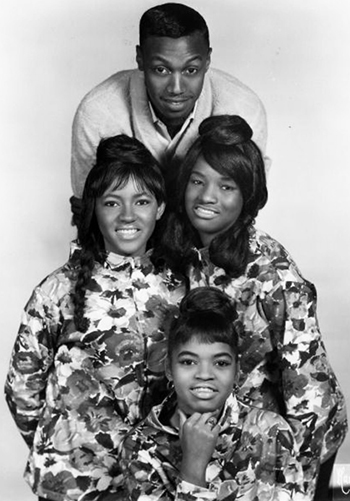 I recognize that a sugary Brill Building girl group Northern Soul offering is an anomaly on this list. But here it is! Making a statement and standing out and offering textural variation and a short escape from my general raw heaviness! While the glossy orchestral veneer stands in direct opposition my usual aesthetics, I love how the relentless handclaps overpower the mix from the first beat, the weird backing vocals, and particularly the way the amazing lead singer phrases as she breezes through the chord changes against the backing vocals in the chorus. “You Don’t Mean Me No Good” sounds like no other record in the way it juxtaposes soulful warmth and spooky emptiness! And it feels so good! The Jellybeans had soul!
I recognize that a sugary Brill Building girl group Northern Soul offering is an anomaly on this list. But here it is! Making a statement and standing out and offering textural variation and a short escape from my general raw heaviness! While the glossy orchestral veneer stands in direct opposition my usual aesthetics, I love how the relentless handclaps overpower the mix from the first beat, the weird backing vocals, and particularly the way the amazing lead singer phrases as she breezes through the chord changes against the backing vocals in the chorus. “You Don’t Mean Me No Good” sounds like no other record in the way it juxtaposes soulful warmth and spooky emptiness! And it feels so good! The Jellybeans had soul!
Jersey City’s The Jelly Beans were a newly formed high school 4/5 girl group (with one guy) when Leiber and Stoller signed them to their iconic Red Bird Records in 1963. The band saw instant success when their debut single “I Want To Love Him So Bad” shot up into the U.S. Top 10, but after its followup release, “Baby Be Mine,” only charted at number fifty-one, they found themselves without a label. Three of the members, Elyse, Maxine, and Alma, soldiered on for one last dance on the short-lived Eskee label, 1965’s “I’m Hip To You,” backed with “You Don’t Mean Me No Good.” Despite the brevity of The Jelly Beans spark, their highly compiled and anthologized material continues to live on. Check out more of their pics on the Doo Wop Blog
473. Tommy Neal “Goin’ To A Happening” (Vault, 1968)
Since I throw “Happenings,” this track has been a none-too-subtle theme that’s fallen in and out of my soul sets for years. A standard in both the Pittsburgh and Northern Soul scenes, and since appearing on an stunning quantity of compilations, from Northern Soul to Mod to Popcorn subcultures and beyond, I feel like “Going To A Happening” has been claimed by so many because it makes the dancers feel like they’re at the right place. What could better romanticize getting lost in the rhythm of a night more than lyrical imagery of jumping on your motorbike to find a hidden dancefloor utopia? The yin of Neal’s earthy vocals add necessary Dionysian character to the yang that is the brilliant Richard “Popcorn” Wylie’s Apollonian smooth ride. Plus its got a beat and you can dance to it…
 Wylie initially released the single on his short-lived local Pameline imprint and then leased the masters to Vault for national distribution. Martin Koppel’s “Popcorn’s Detroit Soul Party” liner notes say Tommy Neal was a Detroit nightclub singer, the record’s Motor City success gave him a bit of an ego, and Wylie severed ties after Neal didn’t turn up for a scheduled appearance promoting the record on Robin Seymour’s TV show.
Wylie initially released the single on his short-lived local Pameline imprint and then leased the masters to Vault for national distribution. Martin Koppel’s “Popcorn’s Detroit Soul Party” liner notes say Tommy Neal was a Detroit nightclub singer, the record’s Motor City success gave him a bit of an ego, and Wylie severed ties after Neal didn’t turn up for a scheduled appearance promoting the record on Robin Seymour’s TV show.
While you could file “Goin’ to a Happening” in your Richard “Popcorn” Wylie section, I’m very interested in the mysterious Tommy Neal. Online sources say Tommy Neal was Thomas Meatley who co-wrote the 1962 Chex classics The Majestics’ “Gwendolyn”/”Lonely Heart” with Wylie along with their “Unhappy and Blue,” and some also claim he was an actual member of the the band (Don’t confuse this amazing Majestics with the dozens of other quality bands recording under the same name across the USA! I have more Majestics records by different bands than any other name.).
Richard “Popcorn” Wylie isn’t only the pianist on all of your favorite early Motown tracks, and wrote, produced, and arranged so many soul classics since, but he also recorded a number of prime cuts under his own name.There’s a wealth of information about Popcorn online and this Soul Source bio is an excellent introduction to this important figure in soul music history.
474. The Lon-Genes “Show Me How To ‘Hunch’ Like That” (Glo-Rae, 1964)
The Hunch was a pre-twist dance step from the late-‘50s and considering the rapid trajectory of dance crazes, combined with the fact that there were also a number of early ‘60s Hunch songs, this one seems to’ve arrived a little late to the party. The other Lon-Genes 45 “Dream Girl” appeared on Kent Harris’ Romark Records around the same time, and an unreleased version of “Show Me How To ‘Hunch’ Like That,” “Show Me How To Shake Like That,” was unearthed for Ace Records’ 2012 “Kent Harris R&B Family” compilation. “Show Me How To Shake Like That” sports the same backing track but a lesser lead vocal performance and slightly different lyrics. Perhaps it was a demo? Harris got a co-writing credit for that track and the B-Side here “Hunch Along With The Lon-Genes” but his name curiously isn’t credited on the A-Side. This platter’s label, the only known release on the Glo-Rae imprint, says “distributed by Rayco Records” – swing-era bandleader Floyd Ray’s L.A. imprint . From its name Glo-Rae appears to be a partnership between Floyd Ray and someone else. So The Lon-Genes relationship with Harris, Romark, and Rayco indicates that this is a Los Angeles record and thus The Lon-Genes were perhaps from the area. But you never know??? I’m a big enough fan of this feel-good romp’s raw eccentricity to have included it on the 2015 Norton Records LP “Souvenirs of the Soul Clap, Vol. 4.”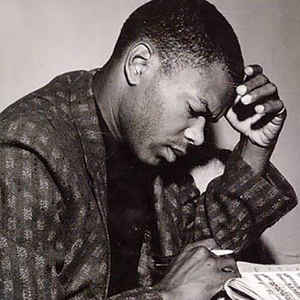 Kent Harris definitely deserves more than a passing mention! Taking the pseudonym “Boogaloo” in Boogaloo and his Gallant Crew” in the ’50s long before the dance move, the Latin soul subgenre, or the domestic terrorist organization, his “Clothes Line (Wrap It Up),” became The Coasters’ “Shoppin’ For Clothes” and Bo Diddley, The Rolling Stones, and more covered the brilliant “Cops And Robbers.” Harris went on to write and produce many more canonical songs over the years like The Duals’ “Stick Shift,” The Utopians “Dutch Treat,” and, the 1961 Soul Clap and Dance-Off Civil Rights era favorite “The Freedom Riders.”
Kent Harris definitely deserves more than a passing mention! Taking the pseudonym “Boogaloo” in Boogaloo and his Gallant Crew” in the ’50s long before the dance move, the Latin soul subgenre, or the domestic terrorist organization, his “Clothes Line (Wrap It Up),” became The Coasters’ “Shoppin’ For Clothes” and Bo Diddley, The Rolling Stones, and more covered the brilliant “Cops And Robbers.” Harris went on to write and produce many more canonical songs over the years like The Duals’ “Stick Shift,” The Utopians “Dutch Treat,” and, the 1961 Soul Clap and Dance-Off Civil Rights era favorite “The Freedom Riders.”
Check out this killer Ponderosa Stomp Kent Harris bio.
475. The Shells “Whiplash” (Conlo, 1965)
Yet another bizarre dance step from Chicago! While I also turn a killer 1965 Leon (Haywood) and The Burner’s organ instro called “Whiplash,” and a couple of other tracks from around the time bear the same title, I get the feeling The Whiplash wasn’t a proper dance step but rather something The Shells invented. But who knows? Dance crazes typically came from the bottom up back then and the Windy City was the land of a thousand dances in the mid-’60s. Also everybody was doin’ The Whip not long before this and you know how one thing leads to another… This infectious hunk o’driving Jerry Butler-produced 100% pure party vibes is also one of the few soul records that gets spins outside of the soul scene because of The Cramps’ appreciation of the track, it’s name/concept, lo-fi garage-y recording, wild distorted guitar bends, and its inclusion on iconic compilations like Todd O Phonic Todd’s “Shakin’ Fit,” “Born Bad, Vol 7,” “Songs The Cramps Taught Us, Vol 1,” and, I’m certain to a much lesser extent, “Souvenirs of the Soul Clap, Vol. 2.” The tuffer-than-leather “Leaving Here” style groove is easy to step to and the spine tingling ghostly group harmony has an ecstatic eeriness that sends “Whiplash” over the top. A deserving classic and demented dance move for all kinds of freaks.
Not much has been detected about Chicago’s Shells except that they had another Jerry Butler-produced single on Volt in 1966 as The Four Shells, “Hot Dog (My Baby’s Comin’ Home)”/”Reputation” and their members were brothers Charles and James Calvin plus Willie Exon and Billy Harper. “Whiplash” is one of only three very different releases on Jerry Butler’s short-lived Conlo imprint (including #486 on this list Jamo Thomas’ “Stop The Baby”).
Check out the fabulous Funky Four Corners appreciation of “Whiplash’s” B-Side “When I’m Blue”
476. Jeb Stuart With The Soul Masters “A Big Blue World” (Pure Gold, 1965)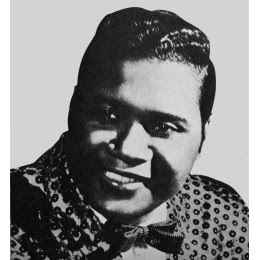 Memphis rockin’ soul from the big blue world where lost late night constitutionals and insomniac depression can only be remedied by the return of a lost lover. On the lustrous Pure Gold imprint, and penned by prolific west coast songwriter Frank J. Jones, “Big Blue World” features unjustly overlooked Bluff City soul man Jeb Stuart rockin’ and soulin’ with gritty dynamic pounding, twang, and immediacy. The Memphis born and bred Stuart split town to study at Chicago Conservatory of Music under Frank Lavere and came back home to start his own band, establish a regular gig at the Southern Club, and ink a record contract with the one and only Sam Phillips. He made the history books during this period for launching Isaac Hayes’ music career. Teenage Black Moses lied that he could play piano, faked his way through his debut, and gradually learned the instrument as he continued on with Stuart’s band. Initially known for his early ’60s run of glossier rock/pop sides for Phillips, Jeb Stuart came into his own in 1965 with the shakers “Big Blue World” and another Soul Clap and Dance-Off spin “The Greasy Frog” (along with their fiery deep soul flip sides!). Stuart rapidly evolved into a top-notch eclectic soul artist as he chugged through the decades with at least a dozen releases on a slew of fly-by-night imprints, his own Great American label, and the regal King Records – updating his sound with the times, getting funky in the ’70s and boogying down in the ’80s.
Memphis rockin’ soul from the big blue world where lost late night constitutionals and insomniac depression can only be remedied by the return of a lost lover. On the lustrous Pure Gold imprint, and penned by prolific west coast songwriter Frank J. Jones, “Big Blue World” features unjustly overlooked Bluff City soul man Jeb Stuart rockin’ and soulin’ with gritty dynamic pounding, twang, and immediacy. The Memphis born and bred Stuart split town to study at Chicago Conservatory of Music under Frank Lavere and came back home to start his own band, establish a regular gig at the Southern Club, and ink a record contract with the one and only Sam Phillips. He made the history books during this period for launching Isaac Hayes’ music career. Teenage Black Moses lied that he could play piano, faked his way through his debut, and gradually learned the instrument as he continued on with Stuart’s band. Initially known for his early ’60s run of glossier rock/pop sides for Phillips, Jeb Stuart came into his own in 1965 with the shakers “Big Blue World” and another Soul Clap and Dance-Off spin “The Greasy Frog” (along with their fiery deep soul flip sides!). Stuart rapidly evolved into a top-notch eclectic soul artist as he chugged through the decades with at least a dozen releases on a slew of fly-by-night imprints, his own Great American label, and the regal King Records – updating his sound with the times, getting funky in the ’70s and boogying down in the ’80s.
Sir Shambling’s Jeb Stuart page
Other Jeb Stuart 45s I’ve spun at the Soul Clap and Dance-Off:
– “The Greasy Frog” (Bingo, 1965)
477. Pat Lucky “Earthquake” (Sue, 1963)
A highly distinctive proto-funkish early soul obscurity on Juggy Murray’s Sue imprint with a voice that’s easy to love above a quirky, imaginative, and busy arrangement/rhythm. I couldn’t find out any information about the highly unknown Pat Lucky and the few clues say very little about this charming platter beyond confirming that you’re listening to a New York City record that was dead on arrival. Collectively the authors Jerome Louis Jackson, Marc Steinberg, and Robert Steinberg’s credits appear on a number of NYC girl group, pop, and soul records (including classics like “Think About The Good Times” and “It’s Easier to Cry”) and I’d conclude that the entire production was conjured in the belly of the legendary mini-Brill Building at 1650 Broadway that also housed Sue Records. Since I’ve only found promo copies traded, this li’l gem probably never saw an official release. However, the existence of a 1965 Kama Sutra productions acetate of “Earthquake’s” flip side “You Sure Can Lie” proves they tried to give Lucky a second chance.
478. Leroy Harris “Crow Baby Crow” (Swan, 1966)
The recording debut of the Kansas City bandleader, vocalist, and guitarist who got some 21st century attention as both Lee Harris and Tear Drops on Numero Group’s “Eccentric Soul: The Forte Label” compilation. Harris’ other singles, all on Kansas City’s Forte Records, are all top-notch and distinctive. And this curious groover on Philadelphia’s eclectic and prolific Swan label is a whole other level of unique. Do The Crow!
The only place I can find to point you for additional information about Leroy Harris is in his Discogs bio.
Other Leroy Harris 45s I’ve spun at NY Night Train Soul Clap and Dance-Off
– “I’m Gonna Get You” (Swan, 1966)
479. Freddie North “The Hurt” (Record Industries Corp, 1964)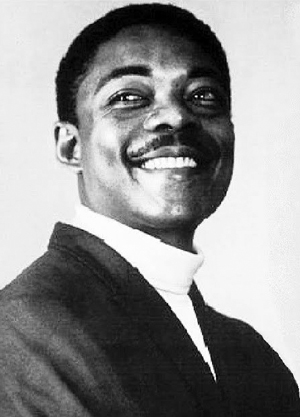 Songwriter Joy Buyers, who penned Betty Everett’s “It Hurts To Be In Love,” Elvis’ “It Hurts Me,”, and Timi Yuro’s masterpiece “What’s A Matter Baby (Is It Hurting You),” is American music’s poet of hurt. And of the four great versions of her composition “The Hurt” that I’ve encountered, B.B. King’s, The Escorts’, and Jimmy Church’s original, Nashville soul legend Freddie North’s is by far my favorite! With a stellar voice and so much soul, hear how North masterfully navigates “The Hurt” and makes it levitate! A powerful exemplar of early southern soul at its finest!
Songwriter Joy Buyers, who penned Betty Everett’s “It Hurts To Be In Love,” Elvis’ “It Hurts Me,”, and Timi Yuro’s masterpiece “What’s A Matter Baby (Is It Hurting You),” is American music’s poet of hurt. And of the four great versions of her composition “The Hurt” that I’ve encountered, B.B. King’s, The Escorts’, and Jimmy Church’s original, Nashville soul legend Freddie North’s is by far my favorite! With a stellar voice and so much soul, hear how North masterfully navigates “The Hurt” and makes it levitate! A powerful exemplar of early southern soul at its finest!
Though he was the son of a gospel singer and grew up on sacred music, Freddie North’s recording debut was the classic doo wop rocker ”Money Money Money” released under the his real name Freddie Carpenter (and The Rookies). He went solo as Freddie North with 1960’s “OK, So What,” kicking off a label-bouncing string of singles and LPs into the 1970s. The early ones were optimistically released on bigger labels like Phillips, Capitol, and the big indie Abet (Nashboro), plus this one on Nashville’s quirky Recording Industries Corp imprint. Since his records weren’t ringing many cash registers, he made ends meet doing odd jobs deep in the molten core of Music City’s sprawling industry – DJing at historic radio powerhouse WLAC, doing promotions for Nashboro Records, and singing demos for Nashville publishing houses. His patience and persistence paid off when, in 1971, after signing to Jerry Williams Jr. aka Swamp Dogg’s Mankind imprint, he finally scored a Top 10 R&B / Top 40 Pop hit with Williams and Gary U.S. Bonds’ “She’s All I Got.” He returned to the R&B charts once more with its followup “You and Me Together Forever” but after eight less commercially successful Mankind singles and some time in the producer’s chair, Freddie North quit secular music to become a pastor.
Read a detailed Freddie North biography on Derek’s Music Blog
Watch Freddie North and Swamp Dogg discussing “She’s All I Got” in 2019.
Other Freddie North 45s I’ve spun at New York Night Train Soul Clap & Dance-Off
– Love To Hate (Abet, 1970)
480. Theola Kilgore ?”Chain Gang (The Sound Of My Man)” (Candix, 1960)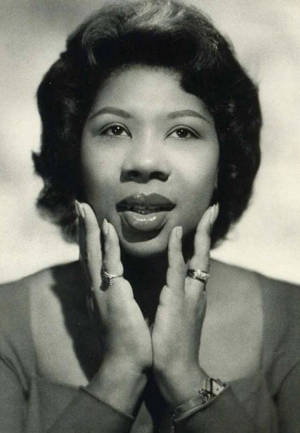 While Sam Cooke’s excellent original classic “Chain Gang” is clearly sympathetic to the hard predicament of prison labor, the track overall, lyrically mostly detached in third person and augmented by an airy delivery and glossy upbeat production, comes off more like an ambiguous tableau than a protest song about the 20th Century version of slavery. But we need to consider that 1964’s “A Change Is Gonna Come” was culturally light years ahead of 1960, and there were limits to what a gospel singer crossing over to pop (i.e. white) music on RCA records could’ve explicitly said at this point. And Cooke does slip into the first person at a couple of points later in the song: when he becomes the prisoner dreaming of going home to see his love and when he says “my work is so hard/give me water / I’m thirsty.” And while his intent is certainly empathy, “Chain Gang” feels like it could’ve just as easily been a snapshot of distant rural highway workers in stripes from a car gently gliding past.
While Sam Cooke’s excellent original classic “Chain Gang” is clearly sympathetic to the hard predicament of prison labor, the track overall, lyrically mostly detached in third person and augmented by an airy delivery and glossy upbeat production, comes off more like an ambiguous tableau than a protest song about the 20th Century version of slavery. But we need to consider that 1964’s “A Change Is Gonna Come” was culturally light years ahead of 1960, and there were limits to what a gospel singer crossing over to pop (i.e. white) music on RCA records could’ve explicitly said at this point. And Cooke does slip into the first person at a couple of points later in the song: when he becomes the prisoner dreaming of going home to see his love and when he says “my work is so hard/give me water / I’m thirsty.” And while his intent is certainly empathy, “Chain Gang” feels like it could’ve just as easily been a snapshot of distant rural highway workers in stripes from a car gently gliding past.
Simply reversing the perspective into the first person, Theola Kilgour transforms the broad landscape into an intimate interior portrait of a woman feeling the absence of the convicted man in her life. And the change of narrator immediately alters our perception – particularly through our contemporary lens emphasizing the roots of the prison industrial complex, its dominance of a good portion of American life, and its persistence up to the present. And thus, whichever version you prefer musically or aesthetically, when heard through today’s ears, Theola Kilgour’s answer song, adorned in rawer production, pushes more emotional buttons than Sam Cooke’s brilliant original. While old-fashioned pop answer songs are disposable-by-design, typically retired to the dustbin within months, this “Chain Gang” still strongly resonates six decades later.
The connection between Oakland gospel/soul phenomenon Theola Kilgore and Sam Cooke doesn’t stop there. When Kilgore was still a Bay Area gospel star, Cooke’s manager J.W. Alexander became a proponent and helped link her with producer Ed Townsend to cut this, her first secular record. Also Kilgore’s next 45 and massive hit “The Love Of My Man” was a secularized update of “The Love Of God” by Cooke’s former gospel group The Soul Stirrers. Kilgore recorded a handful of other quality singles before disappearing from record bins after her 1966 baroque soul pop masterpiece “It’s Gonna Be All Right.”
The best Theola Kilgore bio I could find was at Mental Itch
the YouTube playlist in its entirety


